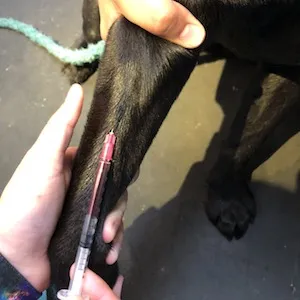Heartworm disease is a severe and potentially fatal condition that affects dogs in the United States and many other parts of the world. Caused by foot-long worms residing in the heart, lungs, and associated blood vessels, it leads to significant lung disease, heart failure, and damage to other vital organs. As a responsible pet owner, you might be wondering about the availability of Over The Counter Heartworm Medication For Dogs to protect your beloved companion. However, it’s crucial to understand that effective and safe heartworm prevention and treatment for dogs are not available over the counter and require veterinary supervision due to the complexities and risks involved. This article will delve into why a veterinarian’s expertise is indispensable in preventing and managing heartworm disease, guiding you towards the safest and most effective approaches to canine heart health.
What is Heartworm Disease and Why is Prevention Paramount?
Heartworm disease, caused by Dirofilaria immitis, is a serious threat. Dogs are natural hosts for heartworms, meaning the parasites mature into adults, mate, and produce offspring within their bodies. Left untreated, the number of worms can escalate, with some dogs harboring hundreds. The disease inflicts lasting damage on the heart, lungs, and arteries, significantly impacting a dog’s health and quality of life even after the worms are eradicated.
Prevention is, by far, the best course of action. Administering proper heartworm medication prevents the larvae transmitted by mosquitoes from developing into adult worms. Early detection and treatment, when necessary, are vital, but prevention remains the cornerstone of heartworm management. If your dog exhibits unusual symptoms, consulting a vet can help rule out various parasitic concerns, including potential issues like my dog has hookworms and pooped in the house, which also require professional diagnosis and treatment.
The Truth About Over-the-Counter Heartworm Medication for Dogs
When considering over the counter hookworm medicine for dogs or any dewormer, it’s easy to assume the same applies to heartworm. However, for heartworm disease, the reality is different. You cannot simply walk into a pet store or pharmacy and purchase heartworm medication without a prescription. The U.S. Food and Drug Administration (FDA) mandates that all heartworm preventatives be dispensed only by or on the order of a licensed veterinarian. This strict regulation is in place for several critical reasons:
- Risk of Severe Reactions: Giving heartworm preventatives to a dog already infected with adult heartworms can lead to severe, even fatal, reactions. These reactions occur because the medication rapidly kills microscopic baby worms (microfilaria) circulating in the bloodstream, leading to a sudden surge of dying parasites that can overwhelm the dog’s system.
- Necessity of Testing: Before prescribing any heartworm preventative, a veterinarian must perform a heartworm test to confirm that your dog is free of adult heartworms. This is why annual testing is a non-negotiable part of responsible heartworm prevention.
- Precise Dosing: Heartworm medications are dosed precisely based on the dog’s body weight. A veterinarian ensures your dog receives the correct dosage, adjusting it as your dog grows or their weight changes. Incorrect dosing can render the medication ineffective or lead to adverse effects.
- Targeting Larval Stages: Approved heartworm preventatives work by eliminating the immature (larval) stages of the heartworm parasite, including infective larvae deposited by mosquitoes and the subsequent larval stage developing inside the animal. They are not effective against adult heartworms.
- No Approved OTC Treatment: There is no over-the-counter treatment available to kill adult heartworms. The only FDA-approved drug for treating adult heartworm infection in dogs, melarsomine, must be administered by injection in a veterinary hospital.
Furthermore, any “natural” prevention methods marketed as an alternative to FDA-approved medications are unproven and potentially dangerous. Relying on such remedies puts your dog at severe risk of developing heartworm disease.
 Close-up view of heartworms in a dog's heart, illustrating the severity of heartworm disease.
Close-up view of heartworms in a dog's heart, illustrating the severity of heartworm disease.
Understanding Heartworm Prevention: Prescription-Only Solutions
Heartworm prevention is highly effective when administered correctly and consistently. Preventatives come in various forms, each requiring a veterinary prescription:
- Oral Medications: Typically given monthly as a chewable tablet.
- Topical Medications: Applied monthly to the skin.
- Injectable Medications: A sustained-release injection administered by a veterinarian every 6 or 12 months.
These medications work by interrupting the heartworm lifecycle, killing the larval stages picked up from mosquito bites before they can mature into adult worms. Because larvae can mature into a juvenile adult stage in as little as 51 days, which preventatives cannot effectively eliminate, it is critically important to administer heartworm preventatives strictly on schedule. Missing even one dose or giving it late can leave your dog unprotected.
Heartworm Testing: A Vital First Step
Annual heartworm testing is essential for all dogs, even those on year-round prevention. Heartworm preventatives are highly effective but not 100% foolproof. A missed dose, a spit-out pill, or a rubbed-off topical medication can leave your dog vulnerable. Regular testing ensures that if an infection occurs, it can be detected early, improving the chances of a successful outcome.
- Puppies: Puppies under 7 months can typically start prevention without an initial test, as it takes at least 6 months for a dog to test positive after infection. However, they should be tested 6 months after the initial visit, again 6 months later, and yearly thereafter.
- Adult Dogs: Adult dogs over 7 months of age, or those not previously on a preventative, require a test before starting medication. They also need follow-up tests 6 and 12 months later, and annually thereafter.
- Missed Doses: If you miss doses, restart prevention immediately and retest your dog 6 months later.
The test involves a small blood sample from your dog, detecting the presence of heartworm proteins. Early detection is key, as heartworm disease is progressive, and the sooner it’s caught, the better the prognosis for recovery.
 Veterinary professional drawing a blood sample from a dog for heartworm testing.
Veterinary professional drawing a blood sample from a dog for heartworm testing.
Recognizing Heartworm Symptoms in Dogs
In the early stages, many dogs show few or no symptoms. The longer the infection persists, the more likely signs will develop, especially in active dogs, those with heavy infections, or those with other health problems. Symptoms may include:
- A mild, persistent cough
- Reluctance to exercise
- Fatigue after moderate activity
- Decreased appetite
- Weight loss
As the disease progresses, dogs may develop heart failure, leading to a swollen belly due to fluid accumulation. A severe, life-threatening form, known as caval syndrome, can occur with large numbers of heartworms, causing sudden breathing difficulty, pale gums, and dark, coffee-colored urine. This condition requires immediate surgical removal of the heartworm blockage. While general worm infections might sometimes lead to severe issues like can worms in dogs cause bloody diarrhea, heartworm symptoms specifically focus on respiratory and cardiovascular distress.
What if Your Dog Tests Positive? The Veterinary Treatment Process
Discovering your dog has heartworms can be alarming, but most infected dogs can be successfully treated under veterinary care. The treatment for adult heartworms is complex, requiring specific medications and strict protocols. This is another reason why over the counter heartworm medication for dogs is not a viable option.
Here’s what to expect:
- Confirm the Diagnosis: The initial positive antigen test will be confirmed with an additional, different test.
- Restrict Exercise: This is crucial. Physical exertion increases the damage heartworms cause to the heart and lungs. Your dog’s activity will be severely limited.
- Stabilize Your Dog’s Health: Before specific heartworm treatment can begin, your veterinarian may need to stabilize your dog’s condition with appropriate therapy, especially in severe cases.
- Administer Treatment (Melarsomine): The FDA-approved treatment involves a series of melarsomine injections, administered deeply into the muscle. This is typically done in a veterinary hospital setting. Your vet may also recommend other medications to improve treatment success and reduce side effects.
- Follow-Up Testing and Prevention: Approximately 9 months after treatment, a heartworm test confirms the elimination of all worms. To prevent reinfection, year-round heartworm prevention will be administered for the rest of your dog’s life.
It’s vital to follow your veterinarian’s instructions meticulously during and after treatment. Exercise restriction is the leading factor in preventing complications. Starting prevention before treatment also helps ensure your dog doesn’t get a new infection while being treated and prevents your dog from being a source of infection for other animals. Understanding disease transmission, such as whether can worms be passed from dog to dog, is important for managing a multi-pet household during treatment.
 A dog resting comfortably in a veterinary recovery cage during heartworm treatment.
A dog resting comfortably in a veterinary recovery cage during heartworm treatment.
Heartworm Risk Factors and Year-Round Prevention
Heartworm disease has been diagnosed in all 50 states, and the risk factors are difficult to predict. Mosquitoes, which are the essential vectors in the heartworm life cycle, can be carried great distances by wind, and infected wildlife (like coyotes and foxes) can act as reservoirs for the disease. Even pets that spend most of their time indoors are at risk, as mosquitoes can easily enter homes.
The American Heartworm Society (AHS) recommends the “Think 12” approach:
- Get your pet tested every 12 months for heartworm.
- Give your pet heartworm preventative 12 months a year.
This year-round prevention strategy is recommended regardless of climate, as mosquito seasons can vary, and some species can overwinter indoors. Moreover, many heartworm preventatives also protect against intestinal parasites, some of which, like hookworms, can pose risks to humans as well. Knowing if can i catch worms from my dog is a concern for many owners, and combination preventives offer broader protection.
 Map showing the incidence and geographical spread of heartworm disease in dogs across the United States.
Map showing the incidence and geographical spread of heartworm disease in dogs across the United States.
The Role of Your Veterinarian: Your Best Resource
Your veterinarian is your most important partner in protecting your dog from heartworm disease. They provide:
- Accurate Diagnosis: Performing necessary tests to determine your dog’s heartworm status.
- Tailored Prevention Plans: Prescribing the appropriate FDA-approved heartworm preventative based on your dog’s age, weight, lifestyle, and local risk factors.
- Safe Treatment Protocols: If your dog tests positive, your vet will guide you through the complex and potentially risky treatment process, minimizing complications.
- Integrated Parasite Control: Many heartworm preventatives offer additional protection against other internal and external parasites. Your vet can recommend the best comprehensive solution.
Attempting to acquire over the counter heartworm medication for dogs not only puts your dog at risk but also bypasses the crucial diagnostic and advisory steps that only a qualified veterinarian can provide.
 A veterinarian examining a dog, highlighting the importance of professional veterinary consultation for heartworm prevention.
A veterinarian examining a dog, highlighting the importance of professional veterinary consultation for heartworm prevention.
Conclusion
The search for over the counter heartworm medication for dogs stems from a natural desire to protect your pet, but it’s vital to understand why this approach is not feasible or safe. Heartworm disease is a serious, complex illness that requires professional veterinary guidance for both prevention and treatment. FDA regulations and the biological realities of the disease necessitate prescription-only medications and comprehensive veterinary care, including annual testing. Prioritizing your dog’s long-term health means embracing year-round, vet-prescribed heartworm prevention. Don’t risk your dog’s well-being with unproven or improperly administered products. Always consult your veterinarian to ensure your beloved companion receives the best possible protection against heartworm disease.
References
- American Heartworm Society. (n.d.). Pet Owner Resources. Retrieved from https://www.heartwormsociety.org/pet-owner-resources
- U.S. Food and Drug Administration. (n.d.). Animal & Veterinary. Retrieved from https://www.fda.gov/animal-veterinary/animal-health-literacy/all-about-heartworm
